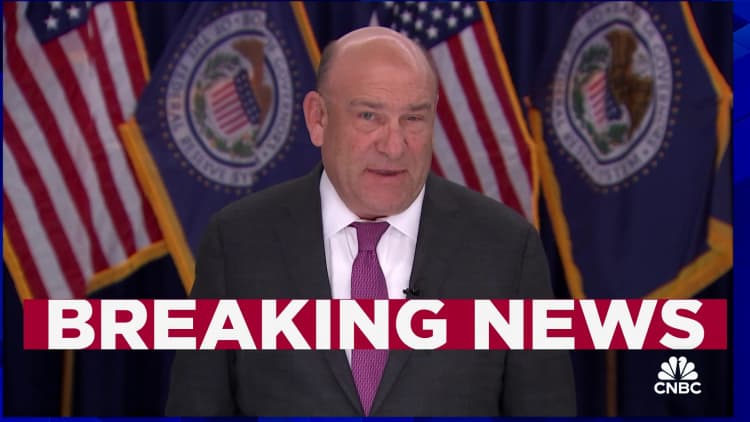
watch
now
WASHINGTON
–
Federal
Reserve
officials
indicated
at
their
last
meeting
that
they
were
in
no
hurry
to
cut
interest
rates
and
expressed
both
optimism
and
caution
on
inflation,
according
to
minutes
from
the
session
released
Wednesday.
The
discussion
came
as
policymakers
not
only
decided
to
leave
their
key
overnight
borrowing
rate
unchanged
but
also
altered
the
post-meeting
statement
to
indicate
that
no
cuts
would
be
coming
until
the
rate-setting
Federal
Open
Market
Committee
held
“greater
confidence”
that
inflation
was
receding.
“Most
participants
noted
the
risks
of
moving
too
quickly
to
ease
the
stance
of
policy
and
emphasized
the
importance
of
carefully
assessing
incoming
data
in
judging
whether
inflation
is
moving
down
sustainably
to
2
percent,”
the
minutes
stated.
The
meeting
summary
did
indicate
a
general
sense
of
optimism
that
the
Fed’s
policy
moves
had
succeeded
in
lowering
the
rate
of
inflation,
which
in
mid-2022
hit
its
highest
level
in
more
than
40
years.
However,
officials
noted
that
they
wanted
to
see
more
before
starting
to
ease
policy,
while
saying
that
rate
hikes
are
likely
over.
“In
discussing
the
policy
outlook,
participants
judged
that
the
policy
rate
was
likely
at
its
peak
for
this
tightening
cycle,”
the
minutes
stated.
But,
“Participants
generally
noted
that
they
did
not
expect
it
would
be
appropriate
to
reduce
the
target
range
for
the
federal
funds
rate
until
they
had
gained
greater
confidence
that
inflation
was
moving
sustainably
toward
2
percent.”
Before
the
meeting,
a
string
of
reports
showed
that
inflation,
while
still
elevated,
was
moving
back
toward
the
Fed’s
2%
target.
While
the
minutes
assessed
the
“solid
progress”
being
made,
the
committee
viewed
some
of
that
progress
as
“idiosyncratic”
and
possibly
due
to
factors
that
won’t
last.
Consequently,
members
said
they
will
“carefully
assess”
incoming
data
to
judge
where
inflation
is
heading
over
the
longer
term.
Officials
noted
both
upside
and
downside
risks
and
worried
about
lowering
rates
too
quickly.
Questions
over
how
quickly
to
move
“Participants
highlighted
the
uncertainty
associated
with
how
long
a
restrictive
monetary
policy
stance
would
need
to
be
maintained,”
the
summary
said.
Officials
“remained
concerned
that
elevated
inflation
continued
to
harm
households,
especially
those
with
limited
means
to
absorb
higher
prices,”
the
minutes
said.
“While
the
inflation
data
had
indicated
significant
disinflation
in
the
second
half
of
last
year,
participants
observed
that
they
would
be
carefully
assessing
incoming
data
in
judging
whether
inflation
was
moving
down
sustainably
toward
2
percent.”
The
minutes
reflected
an
internal
debate
over
how
quickly
the
Fed
will
want
to
move
considering
the
uncertainty
about
the
outlook.
Since
the
Jan.
30-31
meeting,
the
cautionary
approach
has
borne
out
as
separate
readings
on
consumer
and
producer
prices
showed
inflation
running
hotter
than
expected
and
still
well
ahead
of
the
Fed’s
2%
12-month
target.
Multiple
officials
in
recent
weeks
have
indicated
a
patient
approach
toward
loosening
monetary
policy.
A
stable
economy,
which
grew
at
a
2.5%
annualized
pace
in
2023,
has
encouraged
FOMC
members
that
the
succession
of
11
interest
rate
hikes
implemented
in
2022
and
2023
have
not
substantially
hampered
growth.
To
the
contrary,
the
U.S.
labor
market
has
continued
to
expand
at
a
brisk
pace,
adding
353,000
nonfarm
payroll
positions
in
January.
First-quarter
economic
data
thus
far
is
pointing
to
GDP
growth
of
2.9%,
according
to
the
Atlanta
Fed.
Along
with
the
discussion
on
rates,
members
also
brought
up
the
bond
holdings
on
the
Fed’s
balance
sheet.
Since
June
2022,
the
central
bank
has
allowed
more
than
$1.3
trillion
in
Treasurys
and
mortgage-backed
securities
to
roll
off
rather
than
reinvesting
proceeds
as
usual.
‘Ample
level
of
reserves’
The
minutes
indicated
that
a
more
in-depth
discussion
will
take
place
at
the
March
meeting.
Policymakers
also
indicated
at
the
January
meeting
that
they
are
likely
to
take
a
go-slow
approach
on
a
process
nicknamed
“quantitative
tightening.”
The
pertinent
question
is
how
high
reserve
holdings
will
need
to
be
to
satisfy
banks’
needs.
The
Fed
characterizes
the
current
level
as
“ample.”
“Some
participants
remarked
that,
given
the
uncertainty
surrounding
estimates
of
the
ample
level
of
reserves,
slowing
the
pace
of
runoff
could
help
smooth
the
transition
to
that
level
of
reserves
or
could
allow
the
Committee
to
continue
balance
sheet
runoff
for
longer,”
the
minutes
said.
“In
addition,
a
few
participants
noted
that
the
process
of
balance
sheet
runoff
could
continue
for
some
time
even
after
the
Committee
begins
to
reduce
the
target
range
for
the
federal
funds
rate.”
Fed
officials
consider
current
policy
to
be
restrictive,
so
the
big
question
going
forward
will
be
how
much
it
will
need
to
be
relaxed
both
to
support
growth
and
control
inflation.
There
is
some
concern
that
growth
continues
to
be
too
fast.
The
consumer
price
index
rose
3.1%
on
a
12-month
basis
in
January
–
3.9%
when
excluding
food
and
energy,
the
latter
of
which
posted
a
big
decline
during
the
month.
So-called
sticky
CPI,
which
weighs
toward
housing
and
other
prices
that
don’t
fluctuate
as
much,
rose
4.6%,
according
to
the
Atlanta
Fed.
Producer
prices
increased
0.3%
on
a
monthly
basis,
well
above
Wall
Street
expectations.
In
an
interview
on
CBS’
“60
Minutes”
that
aired
just
a
few
days
after
the
FOMC
meeting,
Chair
Jerome
Powell
said,
“With
the
economy
strong
like
that,
we
feel
like
we
can
approach
the
question
of
when
to
begin
to
reduce
interest
rates
carefully.”
He
added
that
he
is
looking
for
“more
evidence
that
inflation
is
moving
sustainably
down
to
2%.”
Markets
have
since
had
to
recalibrate
their
expectations
for
rate
cuts.
Where
traders
in
the
fed
funds
futures
market
had
been
pricing
in
a
near
lock
for
a
March
cut,
that
has
been
pushed
out
to
June.
The
expected
level
of
cuts
for
the
full
year
had
been
reduced
to
four
from
six.
FOMC
officials
in
December
projected
three.
Don’t
miss
these
stories
from
CNBC
PRO:
